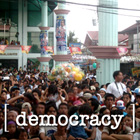
|
PROJECTS RANGE FROM ASSASSINATION ATTEMPTS TO ILLEGAL DOMESTIC SPYING, COLLUSION IN WATERGATE CRIMES 27 June 2007 The CIA has released hundreds of pages of classified top-secret documents, related to criminal activities contemplated or carried out decades ago. The files are a partial release of an archive compiled at the time of the Watergate hearings, in an effort to gather and control documents related to activities that could break out into scandal if publicly disclosed. The Washington Post reports "the documents chronicle activities including assassination plans, illegal wiretaps and hunts for spies at political conventions. One document spoke of a plan to poison an African leader. Another revealed that the CIA had offered a Mafia boss $150,000 to kill Cuba's Fidel Castro". The Post article also reports that "In October 1967, President Lyndon B. Johnson requested an interagency survey of possible foreign connections to U.S. groups opposed to the Vietnam War and worldwide student movements with communist links." Certain elements of the materials released confirm long-standing suspicions and may provoke further inquiries. CIA director, Air Force Gen. Michael Hayden, has reportedly told staff the materials illustrate how the political pressure of the Watergate era created a climate of reform in which harsher oversight and internal review gave the CIA "a far stronger place in our democratic system". Hayden also recognized the documents showed the CIA was involved in some things it "should not have done". These statements come at a time when the CIA has been under heavy criticism at home and abroad for operating an extrajudicial system of prison camps in foreign countries, for secret flights transporting detainees without extradition hearings, and for alleged use of torture in interrogations. Each of these projects being admitted to by the Bush administration in an effort to calm criticism of ongoing secrecy. Meanwhile, critics have watched to see whether Gen. Hayden, the first military officer to hold the post of CIA director, would push for reform and openness or whether he would spearhead an intensified effort to protect the agency's secrecy powers. According to the released documents, the CIA set up a location across from the Washington Post offices to spy on the paper and its reporters, in an effort to uncover possible sources of leaked intelligence or policy information. There was also a connection to a plan to pay off the Watergate burglars to keep them quiet. In May 1973, then director Schlesinger asked aides to "report to me immediately on any activities now going on, or that have gone on in the past, which might be construed to be outside the legislative charter of this Agency". The result was a wave of "responses, sent by division heads, low-level bureaucrats and retired operatives, included lengthy explanations of illegal surveillance and pithy recollections of long-ago black operations". Not all of this material has been made public, and there is some concern about whether or not agency operatives may have been involved in some of the assassination attempts the planning for which is seen in these documents. The representation of "sensitive intercepts" collected by the National Security Agency reminds of the blanket warrantless wiretapping carried out by the current administration since 2001. In one bizarre scenario, after Pres. Nixon gave a speech defending his extralegal incursion into Cambodia, the president tasked the CIA to fund the response process for those letters written in support of his policies. The State Dept. was asked to respond to those who criticized the policy. [s]
|
||||||||||
|
|||||||||||



